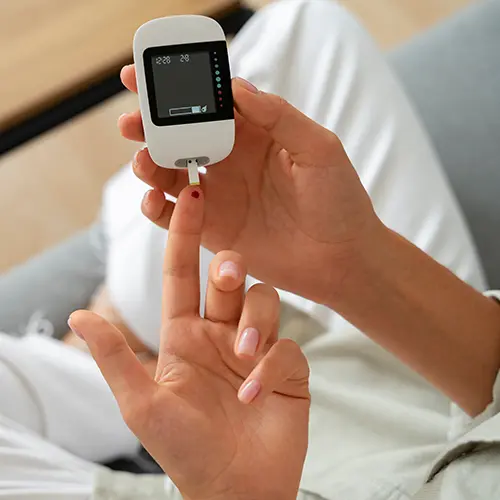Table of Contents
When is the best timing to take a pregnancy test? Embarking on the journey to parenthood can be filled with anticipation and questions, especially when it comes to taking a pregnancy test.
Understanding the right timing is crucial for accurate results. In this blog post, we delve into the best practices and tips for timing your pregnancy test.
We'll explore the science behind pregnancy tests, the ideal time to take them for the most reliable outcome, and how to interpret the results.
Whether you're trying to conceive or simply want to be informed, this guide will provide valuable insights.
From considering your menstrual cycle to understanding the role of hormone levels, we'll equip you with the knowledge you need to make this significant step in your journey with confidence.
Join us as we unravel the mysteries of timing your pregnancy test accurately and effectively.
When is the best time to take a pregnancy test?
The best time to take a pregnancy test is typically one week after you've missed your period. This timing allows for the most accurate results. Here's why:
- HCG Levels: Pregnancy tests work by detecting the hormone human hCG in your urine. HCG is produced by the developing placenta after a fertilized egg attaches to the uterine lining. In the early stages of pregnancy, hCG levels increase rapidly.
- Missed Period: Waiting until you've missed your period ensures that there is enough hCG in your body to be detected by the test. Most pregnancy tests are designed to be highly sensitive, but taking the test too early, before your missed period, can result in a false negative.
- Accurate Results: By waiting until after your missed period, you increase the likelihood of obtaining an accurate and reliable result. Testing too early may not provide enough hCG in your urine for the test to detect.
If you're unsure about the timing or have irregular periods, it's a good idea to consult with your healthcare provider for guidance on when to take a pregnancy test. Additionally, follow the instructions on the pregnancy test kit carefully for the best results.
Can I take a pregnancy test any time of day?
Yes, you can take a pregnancy test at any time of the day. However, there are some considerations to keep in mind:
- First-Morning Urine: Taking a pregnancy test with your first-morning urine is often recommended because it is more concentrated. The concentration of the hormone hCG that the test detects is typically higher in the morning, especially if you haven't consumed fluids during the night. This higher concentration can potentially provide a more accurate result.
- Daytime Testing: If you choose to take the test during the day, it's a good practice to avoid excessive fluid intake for at least a few hours before testing. This can help ensure that your urine is not overly diluted, which might make it more challenging for the test to detect hCG.
- Follow Test Instructions: Regardless of the time of day, it's crucial to carefully follow the instructions provided with the pregnancy test kit. These instructions will specify how to collect the urine sample and the recommended wait time for results.
- Consistency: If you decide to take multiple pregnancy tests to confirm the results, try to do so at the same time of day for consistency. This can help you better track changes in hCG levels over time.
In summary, while first-morning urine is often recommended for pregnancy testing, modern pregnancy tests are designed to be sensitive and can be taken at any time of day. Following the test instructions and taking precautions to avoid excessive fluid intake can help ensure accurate results.
What factors can affect the accuracy of a pregnancy test?
Several factors can influence the accuracy of a pregnancy test. It's important to be aware of these factors to ensure you get reliable results:
- Timing: Taking the test too early can result in a false negative. The best time to take a pregnancy test is typically one week after you've missed your period. Testing too soon may not detect the presence of the hormone hCG in your urine, even if you are pregnant.
- Test Sensitivity: Different pregnancy tests have varying levels of sensitivity. Some tests are more sensitive than others and can detect lower levels of hCG. Using a highly sensitive test can potentially provide earlier detection of pregnancy.
- Expired Tests: Always check the expiration date on the pregnancy test kit. Using an expired test can lead to inaccurate results.
- Incorrect Use: Failing to follow the instructions provided with the test kit can affect accuracy. Ensure you understand how to collect the urine sample and interpret the results correctly.
- Diluted Urine: Drinking a large amount of fluids before taking the test can dilute your urine and potentially make it more challenging for the test to detect hCG. It's a good idea to avoid excessive fluid intake for a few hours before testing.
- Medical Conditions and Medications: Some medical conditions and medications can interfere with pregnancy test results. Fertility drugs containing hCG can lead to false positives, while certain medical conditions may affect hormone levels.
- Errors in Testing: Human error, such as misinterpreting the results or using a contaminated sample, can lead to inaccurate results. Ensure you read the results within the specified time frame and handle the test kit properly.
- Ectopic Pregnancy: In rare cases, a positive pregnancy test result may indicate an ectopic pregnancy (a pregnancy outside the uterus). This can be a serious medical condition and requires immediate medical attention.
- Chemical Pregnancy: A chemical pregnancy is a very early miscarriage that occurs shortly after implantation. It can result in a positive pregnancy test followed by a negative test, as hCG levels drop rapidly. This is relatively common and may lead to confusion.
If you have concerns about the accuracy of your pregnancy test results, it's advisable to consult with your healthcare provider for further evaluation and guidance.
They can perform additional tests and provide you with the most accurate information about your pregnancy status.
Can medications affect pregnancy test results?
Yes, certain medications can potentially affect the results of a pregnancy test. It's important to be aware of these medications and their potential impact on pregnancy tests. Here are some key points to consider:
- Fertility Drugs: Some fertility medications contain hCG or substances that can mimic hCG. These drugs are used to induce ovulation and can lead to elevated hCG levels in the body. If you take a pregnancy test shortly after using fertility drugs, it may produce a false positive result. If you're taking fertility medications and want to take a pregnancy test, it's essential to consult with your healthcare provider for guidance on when to test.
- Hormone Medications: Certain hormone medications, such as those containing hCG or luteinizing hormone (LH), can interfere with pregnancy test results. These medications can potentially lead to false positives or affect the accuracy of the test.
- Antipsychotic Medications: Some antipsychotic medications, particularly those containing phenothiazines, may interfere with pregnancy test results. It's important to discuss any concerns about medication interference with your healthcare provider.
- Medications for Medical Conditions: While most medications used to treat medical conditions should not affect pregnancy tests, it's advisable to consult with your healthcare provider if you have concerns. They can provide guidance specific to your medication regimen and medical history.
- Over-the-Counter Medications: Over-the-counter medications like pain relievers, antibiotics, or cold medications should not impact pregnancy test results.
If you are taking any medications and are uncertain about their potential effects on a pregnancy test, it's recommended to consult with your healthcare provider.
They can provide personalized advice based on your medication history and can help determine the best timing for taking a pregnancy test to ensure accurate results.
Additionally, if you suspect you may be pregnant and are taking medications, your healthcare provider can perform confirmatory tests to assess your pregnancy status accurately.
What should I do if I get a positive result?
If you get a positive result on a pregnancy test, it's important to take the following steps:
- Confirm the Result: While most pregnancy tests are highly accurate, it's a good practice to confirm the result with a second test from a different brand or a different kit. False positives are rare but can occur. Testing again can provide reassurance.
- Schedule an Appointment with a Healthcare Provider: Contact your healthcare provider to schedule an appointment for a confirmatory test and to discuss your pregnancy. Healthcare providers can conduct blood tests that measure the exact level of hCG in your system, providing a more precise assessment of your pregnancy.
- Start Prenatal Care: If the pregnancy is confirmed, it's essential to begin prenatal care as early as possible. Prenatal care is crucial for monitoring the health of both you and your developing baby. Your healthcare provider will guide you through the necessary tests, vaccinations, and dietary recommendations.
- Discuss Options: Pregnancy comes with various choices and decisions. Take the time to discuss your options with your healthcare provider. You can talk about prenatal care, birthing options, and any concerns or questions you may have.
- Make Lifestyle Adjustments: If you haven't already, consider making healthy lifestyle changes. This includes maintaining a balanced diet, staying active, avoiding harmful substances like alcohol and tobacco, and taking prenatal vitamins with folic acid. Your healthcare provider can provide guidance on these aspects.
- Share the News: Decide when and how you want to share the news of your pregnancy with your partner, family, and friends. This can be an exciting and emotional time, and having a support system is valuable.
- Educate Yourself: Consider reading books or taking classes about pregnancy, childbirth, and parenting. Being informed can help alleviate anxiety and prepare you for the journey ahead.
- Financial Planning: Assess your financial situation and plan for the costs associated with pregnancy and childbirth. This includes healthcare expenses, maternity leave, and baby-related expenses.
- Emotional Well-being: Pregnancy can bring about a range of emotions. It's essential to take care of your emotional well-being. If you experience mood swings, anxiety, or other emotional changes, don't hesitate to seek support from a counselor or therapist.
- Follow Medical Advice: Throughout your pregnancy, follow the guidance and advice of your healthcare provider. Attend prenatal appointments, undergo recommended tests and screenings, and adhere to any prescribed treatments or medications.
Remember that every pregnancy is unique, and it's important to tailor your approach to your specific circumstances and needs.
Seeking early and regular prenatal care is crucial for a healthy pregnancy and the well-being of both you and your baby. Your healthcare provider will be your trusted source of information and support throughout this journey.
What if the test is negative, but I still think I might be pregnant?
If you receive a negative result on a pregnancy test but still believe you might be pregnant, there are several steps you can take:
- Wait and Retest: Sometimes, taking a pregnancy test too early can lead to a false negative result because the levels of the hormone hCG may not be high enough to detect. It's advisable to wait a few days to a week and then retest with a new pregnancy test. Make sure to follow the test instructions carefully.
- Test in the Morning: If you choose to retest, consider using your first-morning urine. This urine tends to be more concentrated and may contain higher levels of hCG, increasing the likelihood of an accurate result.
- Check the Test Expiry Date: Ensure that the pregnancy test you use is not expired. Expired tests may not provide reliable results.
- Use a Different Brand: If you've already taken one brand of pregnancy test, you can try a different brand. Different tests have varying levels of sensitivity, and one brand may be more sensitive than another.
- Consult Your Healthcare Provider: If you continue to have pregnancy symptoms or suspect you may be pregnant despite negative test results, it's advisable to schedule an appointment with your healthcare provider. They can conduct a blood test to measure hCG levels accurately and provide a definitive answer.
- Consider Other Factors: Sometimes, other factors can mimic pregnancy symptoms. Stress, hormonal changes, illness, or certain medical conditions can lead to symptoms that resemble those of pregnancy. Discuss your symptoms and concerns with your healthcare provider.
- Track Your Menstrual Cycle: If you have irregular periods, tracking your menstrual cycle can be helpful. Understanding your cycle and when you ovulate can assist in determining the best time to take a pregnancy test.
- Address Underlying Health Issues: If you have underlying health conditions that may affect your reproductive system, discuss these with your healthcare provider. Conditions such as polycystic ovary syndrome (PCOS) can lead to irregular periods and fertility issues.
It's essential to remain patient and not become discouraged if you receive a negative result initially. False negatives can occur, especially if testing too early.
If you suspect you may be pregnant or have concerns about your reproductive health, consulting with a healthcare provider is the best course of action.
They can provide expert guidance, perform necessary tests, and offer advice tailored to your specific situation.
F.A.Q
When is the best time to take a pregnancy test?
The most accurate time to take a pregnancy test is one week after you've missed your period. This allows enough time for the hormone hCG, which indicates pregnancy, to build up to a detectable level in your urine.
Can I take a pregnancy test any time of day?
For the most accurate results, it's best to take the test first thing in the morning when your urine is most concentrated. However, modern pregnancy tests are sensitive enough to be taken at any time of day.
How soon can I take a pregnancy test after unprotected sex?
It's best to wait at least two weeks after unprotected sex before taking a pregnancy test. Taking it too early can lead to a false negative result.
What factors can affect the accuracy of a pregnancy test?
Several factors can affect the accuracy, including taking the test too early, not following the test instructions correctly, the sensitivity of the test, and dilution of the urine sample (if you drink a lot of fluids before the test).
Are digital pregnancy tests more accurate than standard tests?
Digital tests are not necessarily more accurate, but they can be easier to read as they spell out the result (e.g., "Pregnant" or "Not Pregnant") instead of displaying lines.
Can medications affect pregnancy test results?
Most medications will not affect the result. However, fertility drugs containing hCG can cause false positives. If you're on medication and unsure, consult with your healthcare provider.
How do I know if my pregnancy test is working correctly?
Most tests have a control indicator (a line or symbol) that shows if the test is working correctly. If this control indicator doesn't appear, the test may be faulty.
What should I do if I get a positive result?
If your test is positive, schedule an appointment with your healthcare provider to confirm the pregnancy and discuss next steps.
Is it possible to get a false positive result?
False positives are rare but can occur. They can be caused by certain medical conditions, expired tests, or errors in testing.
What if the test is negative, but I still think I might be pregnant?
If the test is negative but you still suspect you're pregnant, wait a few days and retest. If you continue to get negative results but have pregnancy symptoms, consult your healthcare provider.




















